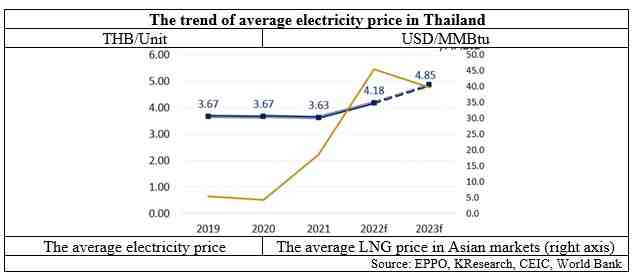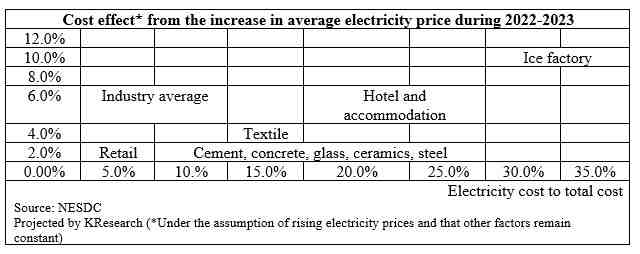The energy crisis caused by the protracted war between Russia and Ukraine has spread to many countries around the world, and European countries in particular are at risk of shortages and price increases for natural gas, a major source of energy. The situation has recently become more worrisome, stemming from a leak in Russia's main gas pipeline to Europe, which, combined with the impending winter in the northern hemisphere, will increase energy demand. In the midst of the above-mentioned crisis, several countries have had to immediately introduce measures to deal with the current energy shortages they face, including reducing energy consumption and even re-examining certain types of power plans, especially nuclear and coal power generation.
Despite Thailand's reliance on natural gas as the primary fuel for power generation, i.e., its share of all fuel sources is as high as 64%, while electricity demand will tend to rise as the economy gradually recovers, the risk of electricity shortages in Thailand will be limited. This is due to Thailand's long term contractual fuel supply plans, including gas supply contracts from the Myanmar and Malaysian gas fields, as well as four LNG import contracts, coupled with the accelerated ramp-up of production capacity at the Gulf of Thailand gas fields during concessionaire conversion to reach full capacity by mid-2024, which will gradually increase domestic gas supply. In addition, Thailand has a plan to use diesel and heavy oil to replace natural gas for power generation at power plants that have the capacity to support diesel and heavy oil generation. Therefore, the risk of a fuel shortage for power generation in Thailand will be limited in the absence of unforeseen events such as natural disasters affecting gas transportation and delivery and unplanned annual shutdowns of gas fields for maintenance.

However, Thailand will still face an upward trend in electricity prices, stemming from the high cost of fossil fuels, although their prices are likely to fall next year, which, coupled with the gradual reduction in government subsidies for electricity and the depreciation of the Thai baht amidst volatility, will still tend to keep electricity prices moving upward next year. KResearch expects the average electricity price to rise to 4.85 baht per unit in 2023, up by 16% from the average rate of 4.18 baht per unit in 2022.

The increase in Thailand's electricity prices, which began in early 2022 and will continue through next year, not only affects consumers’ cost of living and purchasing power, but also puts additional cost pressures on manufacturing and service businesses that are facing rising raw material and labor costs. KResearch estimates that every 1% increase in average electricity prices will increase the average cost of business by about 0.024%, so an increase in electricity prices alone will put about 0.8% additional electricity cost pressure on the business sector during 2022-2023, especially ice plants, hotels and accommodation and textile businesses where electricity costs account for more than 10% of total costs.
With the upward trend in electricity rates affecting business costs, operators will be limited in raising prices of goods or service charges during the period when the economy and consumer purchasing power are just beginning to recover, so operators will need to adopt alternative adjustment approaches to manage electricity costs. In terms of urgent measures, business operators need to actively promote energy conservation activities within their organizations along with other approaches such as plant operators can develop plans to increase the proportion of production during off-peak periods when electricity rates are low. Operators with sufficient conditions can take a medium-term approach such as switching to alternative energy sources with lower electricity costs, especially rooftop solar, which is an alternative energy source that can meet both the low cost of electricity and today’s emerging environmental, social and governance (ESG) considerations for business operations.
Scan QR Code

Annotation
This research paper is published for general public. It is made up of various sources. Trustworthy, but the company can not authenticate. reliability The information may be changed at any time without prior notice. Data users need to be careful about the use of information. The Company will not be liable to any user or person for any damages arising from such use. The information in this report does not constitute an offer. Or advice on business decisions Anyhow.